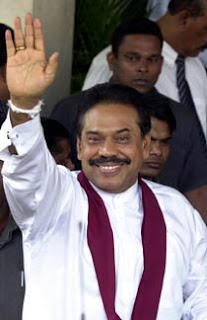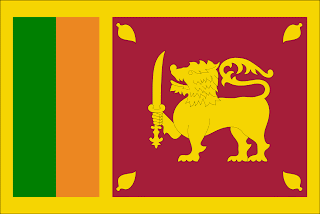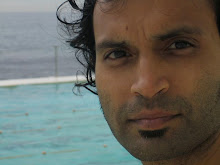Perhaps will we see something similar to what we have witnessed in USA a land where already they are starting to put dreams of action into place, such as with strategies for the energy crisis (see http://repoweramerica.org/)
Scenario 2Imagine if we see President Mahinda Rajapakse start with a speech that addresses us in three languages “Ayubowan, Vannakam, and Greetings to you all” showing that the head of state represents a unified state. He then addresses the plight of all Sri Lankan people for all they have suffered, and in particular the Tamil people of the North who have suffered for years in ways that that many other parts of the island cannot understand, and will only come to realise in years to come, and perhaps never fully understand.
He then goes on to apologise for all the civilians who have suffered, whether it was because of terrorist bombs, and forced child recruitment, suicide bombing, evictions, at the hand of the LTTE, or for aerial attacks and military offensives at the hand of the government. Following this he thanks the military for their protection and sacrifices, but also offers thoughts for the terrorists who were fighting for what they believed was right because of a ideology that they were immersed in and not free to challenge.
He understands that LTTE supporters have had an intense distrust of the government because of this terrible military conflict over the past 25 years, but from this day onwards things will change. He vows to rebuild this trust. Without the confines of terrorist rule and with the freedom that democracy brings they will too taste the fruits of opportunity, and the protection of being an equal Sri Lankan citizen. The Tamil people will be embraced into society for the brothers and sisters that they are, and will be valued by the majority Sinhalese and other minorities for the rich cultural diversity that they provide to the diverse mix that makes Sri Lanka the strength that it is today. It can be even stronger tomorrow with this kind of collaboration of communities.
In addition to this, perhaps he will then go on to add more to his newly made pledge to rebuild trust by making the following statement to the Tamil people.

“We as a nation, and I as a individual, express my deepest sympathies to all the innocent civilians who have lost their lives in this terrible conflict. I am also sorry for all the armed personnel who have lost their lives doing what either they believed in or what they were ordered to do or forced to do.
I am also sorry for those innocent Tamil civilians who lost their lives in the thousands in 1983, and apologise for the state not stepping in to stop this immediately. This was a mistake which was inexcusable and it will never happen again in the new united Sri Lanka that we must all forge together from this day on.
I am sorry for the thousands of Muslim refugees who were forced to leave Jaffna with a day’s notice by the LTTE and continue to live in camps waiting to return to their homelands, I hope you will now be able to do this.
I am sorry to all the innocent Tamil civilians who have felt harassed by the increased scrutiny that they have undergone in recent time in suspicion for being LTTE terrorists. Again we will make steps that this will not happen in the future.
I send out my sympathies in recognition of your suffering.”

Perhaps then the President follows on by saying we must now start working together as a nation, beyond ethnic religious and language barriers, and makes amends to this by inciting a prayer in all the different languages and different religions by different religious leaders.
With regards to the north we must recognise our promises during the many years of negotiations to offer the Tamil people of the North their due respect and autonomy with a political solution that empowers them.
With regards to the other leaders:Again given the hypothetical military defeat of the LTTE in the North, imagine if Velupillai Prabakaran would think of what could ultimately lead to the salvation of the people he claims to support and tells his supporters that they must now change tactics from the military path as a strategy as it will no longer bring peace to the Tamils of Sri Lanka or the North. Now that the territory was in the hands of the government and that they have pledged to grant due power and authority to the Tamil people, we must accept this and work within this system to fight for our rights.

“I fought until the end to deliver what I promised, but too many have died and we must now not think of this as defeat, but a victory for our people, because by struggling so hard the Tamil cause has gained so much recognition we will never experience a situation like in 1983, or 1977 or 1957 again. Because of my movement and your efforts we have created an awareness of the plight of the Tamils in this country and we have fought against this. Now we must work together peacefully and respect all that have died in the process. Never give up the struggle to maintain your rights as a minority, but please just as I now have to look at non military means of effecting change, you must do the same – it is the way forward for our future generations.
President Mahinda Rajapaksa has apologised for the serious events against our people in the past and pledged to make this country a truly multicultural one where a Tamil person can feel a true sense of belonging whilst represented by government, and this will be backed up by legislation and constitution changes to embody these words. This has never been delivered to us in such sincerity before and we must embrace this new opportunity to make this new age of Sri Lanka an incredibly prosperous one for Tamils as well as all Sri Lankans.
I also apologize to all Sri Lankan citizens for the bloodshed and suffering that occured at the hands of my organisation, including child conscription, assasinations and civilian bombings. I was only doing what I felt the government had forced us to do. However, I now know that these methods were wrong and will face the consequences of my actions in the name of my people”

Imagine if the UNP opposition leader, Ranil Wickramasinghe, also chose the high road by saying that “I would like to congratulate Mahinda Rajapakse in his relentless journey to bring this country to peace in the best way he could manage. Now is not the time to bicker about different approaches we have had to achieving the same solution of peace. We now have a situation where there is no direct military conflict or war, and we have a chance to work together to create a prosperous Sri Lanka which is multi cultural, multi lingual and multi religious and we should use this to create the economic paradise that this country should already represent. This is where my skills lie and I will work together with Mr Mahinda Rajapakse in the months to come for the economic prosperity of the country and it’s people, to ensure that we make use of this crucial opportunity rather than fight about small matters.”
Also imagine if the JVP say that that in supporting the sovereignty of Sri Lanka we have to recognise the current military defeat of the LTTE as only the first step in preventing future terrorism by joining together and embracing the sentiments of President Rajapakse and the opposition leader Ranil Wickramasinghe by truly respecting all citizens of this country in the same way, and providing equal rights to all, the poor as well as the rich, and the minorities as well as the majority.
Will the JHU say they would like to like to commend the words of peace being spoken by President and other political leaders. They have great hope for peace in this country and that we must work had to respect diversity and equality just as the Buddhist doctrine encourages, to see things the way that they are.
“We must also try to ensure that no group should be disadvantaged and we must never again realise a situation where so many citizens of this country have been put in a position where they are routinely forced to break the first precept of Buddhism (thou shalt not kill another being) as they have been the case throughout the last 25 years of war. We must also in the true spirit of Buddhism completely put aside ego, and greed for power, in the name of what is right for the country.

Also we Buddhist monks should not maintain our membership with orthodox clergy and hold a position as a minister, for it entails power that is beyond what is humanly possible to resist clinging and craving and is not conducive to the Buddhist doctrine that we have ordained to practice. The fact that other religions also place people in positions of power for the maintenance of the religion is of no consequence. However it is very important that the Buddhist virtues in this country are safeguarded so we will entrust in lay representatives. I will lead the way but announcing my “disrobing” from the Sangha in order to continue on the JHU as a true politician who is in close association with the Sangha but no longer a direct affiliate. I do this in honour of the Sangha, Dhamma and of course the Buddha.”

Imagine if the TNA offer their condolences for all Sri Lankans who have lost life in the recent battles of the north and all Tamils civilian who they primarily represent, followed by a vision for the future. Will they pledge their co-operation with the government in trying to rebuild Jaffna and the entire North as well as be key players in the power sharing that will ensure in this region?
Does all this sound like a situation where we can have peace not just in name but a lasting and enduring peace, supported by all Sri Lankans not just on this island but Sri Lankans abroad who have been responsible for so much funding of this war as well.
Does the notion of lasting peace in Sri Lanka, or one step further even, a multi cultural, muti lingual, multi religious and economically prosperous Sri Lanka sound too incredible a dream to believe? Well look it this way – what about a black man being the president of the USA; a country that was the leader of slavery only a few centuries prior and where institutional segregation thrived as late as in the 1960s.
When I suggested to some Sri Lankan citizens, like myself, the notion that the political leaders of Sri Lanka could co-operate, at least verbally, for the good of the nation at a pivotal and crucial time such as after a military defeat of the LTTE, just as the American leaders did after a crucial election just recently, the response was “this will never happen in Sri Lanka”.
When we look at the two scenarios that have been presented above it does look somewhat incredible for the second option to come true. The phrase “The Audacity of Hope”, the title of Barack Obama’s book, comes to mind.
Leaders of Sri Lanka – why not collaborate for the goal of Peace?Perhaps at this point in time the leaders I mentioned will not be able to come together in the name of improving the country because it means conceding the ideals that they have been representing wholeheartedly during the time of war.
But at the same time we can ask “why not now”? What reasons would there be for President Rajapaksa not to use a military defeat of the LTTE in the North as a good opportunity to apologise for the atrocities of the 1983 riots and also a chance to pledge specifically to make an effort that a unified state would mean that Tamils are ensured to have equal rights?
In considering why the leader don’t just collaborate to achieve peace for the peole that they represent another reason is that the voting public would make it too difficult to do. For example if President Rajapaksa made an apology to the Tamil people for the riots of 1983, as suggested in the hypothetical example, and a majority of voter felt that this was not appropriate then this good gesture of the President will actually threaten his existence. Only if the public create a climate of positivity for this kind of statement will it be possible. Similarly if Mr Prabakaran sent out a strong message to their supporters that they were going to give up their armes and enter into the democratic political mainstream, they may suffer a lack of support if they didn’t agree with this move, because they have been promised more, such as a separate state with two thirds of the island’s coastline at the very least, and if this was the case his support would be cut.
If we, the public, care to look more closely at the political leaders we may notice that their choices also are often not as clear-cut as we think. They are really in the hot seats that we the public put them in.
If we, the public, demand “peace” and allow deviation from the previous party line, then we will give the current leaders more freedom to make more skilful choices of sustainable Peace. If we, the public, have a narrow minded, short-sighted viewpoint then these same leaders will be forced to stick with the status quo for fear of loosing power and we will miss out on innovative new strategies to bring Peace to our country.
Thus when we look at peace in Sri Lanka, we must realise the choice is not just in the hands of the politicians, but the choice is also ours. When we look in the mirror in the morning and ask “why there is still conflict in this country?” –we are usually quick to blame political leaders, military, terrorists. However, in reality we are also to blame, just as a famous quote by Martin Luther King describes it:

“History will have to record that the greatest tragedy of this period of social transition was not the strident clamour of the bad people, but the appalling silence of the good people.”Yes we can change ourselves and our views, but why do we so often not choose to do so?
Also considering the analogy of facing the mirror in the morning and asking the question , “how are we ever going to solve this problem and find lasting peace for our beautiful multicultural island and see it and the people within it prosper?” the flip side is also true. The answer is usually right there starring back at us, and hopefully smiling too.
The only things we need to achieve peace, at least in “our” hearts is that we have to 1) want it, 2) we have to believe it is possible to achieve, and 3) we have to understand that “everyone” needs to contribute in some way, even if it is only in an ideological way.
Let’s make Peace in Sri Lanka a reality, we can get there if we all want it enough and are willing to work together and believe it is possible.
Bishan Rajapakse
Figure 1These pictures are taken within the last 6 month where a group of Sinhalese Buddhists went to offer a Puja with Tamil Hindus in one of our Ancient cities only kilometres from the conflict. Within the last 6 month period prior to this there had been multiple terrorist attacks on civilians. To the north of here there was military offensives. The Hindu priest tells us that 90% of the people who come there are Sinhalese – there is no problem at a community level. He also goes on to say that the Buddhist monk from across the road has always been a great support to him.
This alone shows that Peace is already in the hearts and minds of Sri Lankans in Sri Lanka. This movement of co-operation and understanding only needs to be strengthened. It is possible, it can happen, and it “will happen” – will you be behind the movement or simply critical of it?
(i won't put the pictures of the people faces because I haven't asked for permission to post their photos on the internet, but hopefully the temple and fruit display the moment adequately)



























